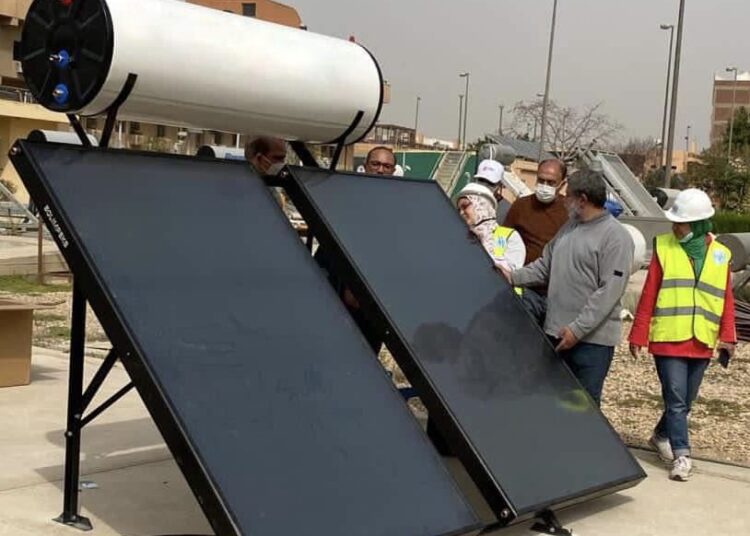By Hamed Mahmoud
Dr. Bassel Al Khatib, Regional Director & UNIDO Representative in Egypt, highlighted that in light of Egypt’s keenness on stepping up the usage of renewable energy, the United Nations Industrial Development Organization (UNIDO) is diligently working on expanding the use of solar thermal technologies in the Egyptian industrial sector in order to alleviate the use of traditional energy in industrial processes and to widen the array of alternative energy sources, and mitigate the environmental eects caused by industrial heating operations.
Dr. Al Khatib has announced that a revolving fund has been recently established collaboratively with the National Bank of Egypt (NBE) within the framework of the “Solar Heating for Industrial Processes” (SHIP) project implemented by UNIDO in cooperation with the Ministry of Trade and Industry. The revolving fund aims at encouraging the Egyptian industrial sector to expand the use of renewables and improving energy eciency. The fund promotes for the installation of solar thermal technologies in order to relinquish the use of fossil fuels.
Mr. Hesham El-Safty, the Group Head of Financial Institutions & International Financial Services at NBE emphasized that the Bank is keen on collaborating with UNIDO to support achieving the Egyptian national agenda “Egypt Vision 2030” and its objectives through supporting the national sustainable development programs and reserving Egypt’s resources through increasing the eciency of using its local renewable energy sources. Mr. El-Safty added that the revolving fund provided by NBE and the Global Environment Facility (GEF) is worth the equivalent of 4 million USD in the Egyptian pound with a competitive interest rate starting from %3.25.
Dr. Gihan Bayoumi, SHIP’s project manager, conrmed that the revolving fund aims to secure funds for installing solar thermal heating systems in manufacturing industries and increasing the thermal energy eciency for the three core industrial sectors which the project targets; food, textiles and chemical sectors. The loan consists of a %50 contribution from the Global Environment Facility with a subsidised interest rate, in addition to a %50 commercial nancing contribution from the NBE. The two nancing sources have merged to provide loans to the beneciaries with competitive interest rates.
Eng. Taymour Ibrahim, SHIP’s technical expert, stated that manufacturing industries from the three sectors are eligible for applying to receive the loan. Industries will receive technical support from UNIDO including the development of detailed energy audits and feasibility studies for installing solar water heating technologies. After the completion of the various studies, the company can apply for the loan at NBE. The amount of the loan is up to %90 of the total investment cost and is paid back over ve years with a grace period of up to one year. In order to apply for the loan, the application form is lled out at any of NBE’s branches or at the “UNIDO” oce, then it is submitted to the Project Management Unit. After the completion of the technical and feasibility studies together with the project management unit at UNIDO, NBE proceeds to conduct the necessary credit worthiness report in order to approve the loan disbursement and start the implementation of the projects.
UNIDO works tirelessly on boosting green nancing mechanisms to facilitate projects operating towards clean energy transition and shedding light on low-cost energy saving opportunities which comes within the context of the Egyptian Integrated Sustainable Energy Strategy (ISES) that aims to increase harnessing energy from alternative renewable sources that remain untapped to reach %42 of the electricity mix by 2035. Thus, UNIDO along with the Egyptian banking sector have been dedicating signicant eorts to expand the green nancing and formulate revolving fund schemes to ensure the sustainability of clean energy transformation and safeguard the environment. Prior eorts were made while taking into account a fundamental notion which is the fact that funding green projects in the industrial sector is the key element to achieve inclusive sustainable development since they lead to substantially lower carbon footprint and improved public health.






Discussion about this post